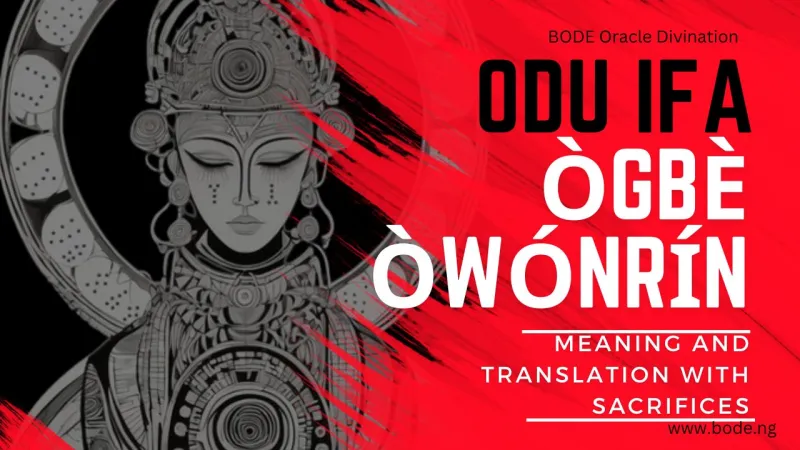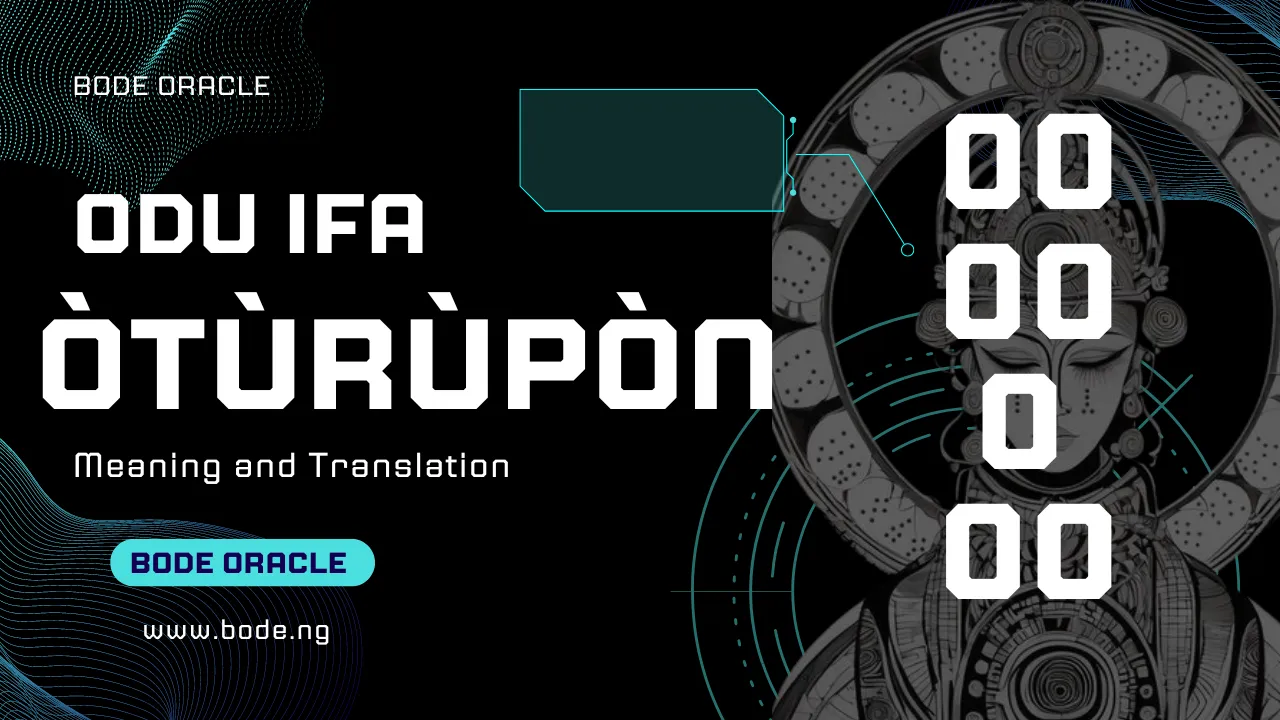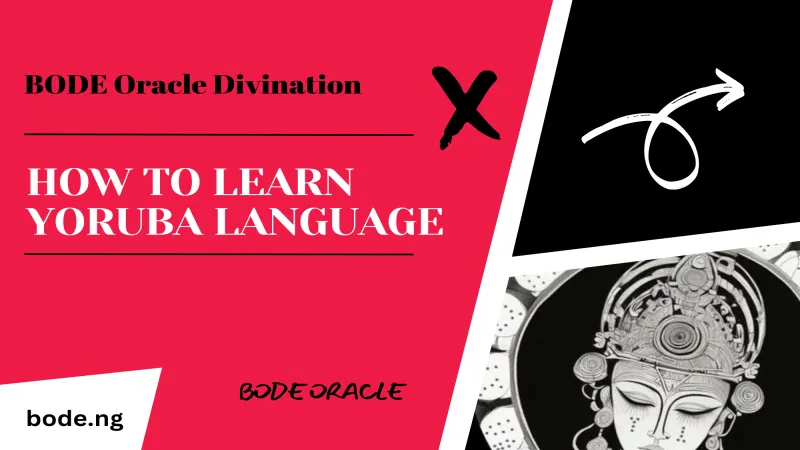Ogbe Owonrin is a significant Odu in Ifa Divination that embodies themes of vigilance, sacrifice, and the complexities of human relationships. It serves as a reminder of the importance of adhering to spiritual guidance and maintaining balance in life.
This Odu emphasizes the consequences of neglecting one's responsibilities and the impact of decisions made in moments of doubt.
The teachings of Ogbe Owonrin encourage individuals to remain aware of their surroundings, to respect the wisdom of Ifa, and to make sacrifices when necessary to ensure the well-being of themselves and their loved ones.
Ultimately, it is a call to be proactive in safeguarding one's relationships and spiritual health.
Ogbe Owonrin, Ogbe Wunle: Ifa Elediro
Ifá says that the one who receives Ogbe Wunle should offer sacrifice so that illness will not afflict their children.
Ifá warns against disobedience and emphasizes that sacrifice is required.
Ìté gùdùgbè
This was the Ifá cast for Elédìró.
The Elédìró referred to here is a hen. In ancient times, a severe head illness was affecting its chicks, so it went to consult Ifá. The priests told it to offer sacrifice, and it was chosen as the required sacrifice.
However, in stubbornness, it ignored the advice and did not offer the sacrifice. As a result, the illness among its chicks worsened. The head illness eventually led to the death of the chicks. Before their deaths, however, they realized that their mother had failed to perform the required sacrifice.
Ogbe Owonrin, Ogbe Wunle: Ifa Molujanjan, the Child of Oluigbo
Ayegbe hin
Ayegbe òhun
This was the Ifá cast for the animals on the day they were competing to marry Molujanjan, the child of Olúigbó.
Ayegbe òhun
This was the Ifá cast for Oore Sẹgi-Sẹgi (the rodent that breaks wood) on the day they were competing to marry Molujanjan, the child of Olúigbó.
The Molujanjan referred to by Ifá is the child of Olúigbó. When it was time for her to marry, the animals began to compete for her hand, each one claiming that it would be her husband.
Among the animals were the elephant, buffalo, antelope, and Oore (the rodent). Olúigbó decided to test them. He said that whoever Molujanjan collects the orange from would marry her. The other animals went to consult Ifá.
They were advised to offer sacrifice. Only Oore made the sacrifice, while the other animals did not. The elephant, buffalo, and antelope believed they would win without making the sacrifice.
Oore went ahead and bought the orange. The orange that Oore bought was the one for which the Ifá priests performed the rites. Time passed, and all the animals gathered, singing their songs, trying to encourage Molujanjan to collect the orange from them.
The elephant was the first to sing:
"Molujanjan, come and collect the orange, àlújanjan-kíjan"
"Molujanjan, come and collect the orange, àlújanjan-kíjan"
"I am the elephant, the leader of the forest, àlújanjan-kíjan"
"Molujanjan, come and collect the orange, àlújanjan-kíjan"
But Molujanjan did not collect the orange from the elephant. Then the buffalo stepped forward and sang:
"Molujanjan, come and collect the orange, àlújanjan-kíjan"
"Molujanjan, come and collect the orange, àlújanjan-kíjan"
"Elephant is the Leader of the forest, alujanjan-kijan"
"I am the buffalo, the son of Odofin, àlújanjan-kíjan"
"Molujanjan, come and collect the orange, àlújanjan-kíjan"
Still, Molujanjan did not collect the orange from the buffalo. Then the antelope sang:
"Molujanjan, come and collect the orange, àlújanjan-kíjan"
"Molujanjan, come and collect the orange, àlújanjan-kíjan"
"Elephant is the Leader of the forest, alujanjan-kijan"
"Buffalo, is the son Odofin, àlújanjan-kíjan"
"I am the antelope, the son of Abila, àlújanjan-kíjan"
"Molujanjan, come and collect the orange, àlújanjan-kíjan"
But Molujanjan did not collect the orange from the antelope. Finally, Oore (the rodent) sang:
"Molujanjan, come and collect the orange, àlújanjan-kíjan"
"Molujanjan, come and collect the orange, àlújanjan-kíjan"
"Elephant is the Leader of the forest, alujanjan-kijan"
"Buffalo, is the son of Odofin, àlújanjan-kíjan"
"Antelope is the son of Abila, àlújanjan-kíjan"
"I am Oore, Our Servants, àlújanjan-kíjan"
"Molujanjan, come and collect the orange, àlújanjan-kíjan"
Molujanjan ran to Oore and collected the orange from him. She exclaimed, “This means you are not their servant,” and Oore affirmed that he was indeed not their servant.
Thus, Oore married Molujanjan, the child of Olúigbó, because he made the sacrifice to Ifá. The Ifá rites performed for the orange ensured that Oore would win Molujanjan over the other animals.
Divination Instruction
This Ifá teaches us not to underestimate others. Ifá says that whoever receives Ogbe Wunle should offer sacrifice to gain favor and respect from others.
Ogbe Owonrin: Ifa for Yeemoo, the Woman of the Orisa
Egbirin is the awo (diviner) of the domestic dog
This was the Ifá cast for Yeemoo,
The wife of the Òrìṣà,
On the day she was lamenting that she could not bear children.
The Yeemoo referred to in this Ifá verse is a woman from ancient times. She had tried for a long time but could not conceive; the desire for children consumed her greatly.
In her desperation, she took an offering of two into three and went to consult the Ifá priests. Ifá told her to offer a sacrifice, assuring her that she would bear many children. The diviners chose the sacrifice for her, and Yeemoo performed the offering.
Olódùmarè heard her cries and sent her sixteen children from the heavens.
Thus, Yeemoo became a mother and praised the Awo (diviners), the Awo praised Ifá, and Ifá praised Olódùmarè.
Divination Instruction
Ifá says that whoever receives Ogbe-Wúnlé should offer a sacrifice to ensure abundant children and should not ignore the significance of the offering. Ifá promises the blessing of children to the seeker.
Ogbe Owonrin: Ifa for Porogodo, the Wife of the Woodpecker
Ifá says that whoever receives Ogbe-Wúnlé should offer a sacrifice so that their spouse is not taken from them, either by force or circumstance. Ifá also advises that the person should avoid falling into defeat.
We weave the roof first
Before weaving the walls
This was the Ifá cast for Porogodo,
The wife of the woodpecker.
The Porogodo mentioned in this Ifá verse is the wife of the woodpecker. The woodpecker, suspicious that someone wanted to take his wife, sought guidance. Ifá advised him to perform a sacrifice.
However, the woodpecker refused to offer the sacrifice, insisting that instead of doing the ritual, he would rely on his cleverness. The woodpecker then used his beak to hollow out a hole in a tree and hid his wife inside, sealing the hole tightly.
But because of his disobedience and arrogance, the woodpecker later forgot the exact spot where he had hidden his wife.
Since that day, the woodpecker has roamed the earth tapping on trees with his beak, distressed and endlessly calling out “porogodo, porogodo” as he searches for his wife in vain.
YORUBA Translation
Ogbe Owonrin, Ogbe Wunle: Ifa Elediro
Ifá ní éni ti ó dá Ogbè wúnlé ki ó rú’bọ ki àrun ki ó bá Ma á ṣe áwọn ọmọ rè.
Ifa pé ki eninan ó má ṣe àigbóràn. Ifá pé ẹbọ ni kó’rú
Ìté gùdùgbè
Ló d’Ífá fún Elédìró
Elédìró tí Ifá sọ yíí, adiyẹ ni. Ni ayé àtijó, àrun orí ńṣe àwọn ọmọ rè, ni ó bá lọ bèrè l’ódó Ifá. Àwọn Awo ní kí ó rú’bọ, wọn yàn án l’ẹbọ. Ṣùgbòn ó fi gbigbó ṣe aláigbó, kó rú’bọ. Ni àrun àwọn ọmọ rè bá tún pò si.
Báyíí ni àrun orí yíí ṣe ńpa àwọn ọmọ ré. Súgbón ki ó tó di wipe wọn ó ma fi ọrún yi’lè, wọn ó mo wipé, iyá áwọn ni kò ṣ’ẹbọ.
Ogbe Owonrin: Ifa Molujanjan Omo Oluigbo
Ayegbe hin
Ayegbe òhun
A d’Ifá fún érìnlójọ ẹranko
L’ọjó tí wón ńlọ rèé fé Mọlújanjan mọ ulúigbó
Ayegbe óhún
A d’Ifá fún oorẹ sẹgi-sẹgi
L’ọjọ tó ńlọ rèé fé Mọlújanjan ọmọ olùigbó
Mọlújanjan tí Ifá sọ yíí, ọmọ olúigbó níí ṣe. ó tó àkókò tí yí óó ni ọkọ, ní àwọn ẹranko bá njá l’òrí i rè. Èkíní wipe òun l’óun ó fẹ, ekeji náà wipe óun ni òun yó fe. Àwọn ẹranko bi erín, efon, àgbònrin, oore. Ni olùigbó bá ni òun ó ṣe ìdànwò fún wọn.
Ení tí ọmọ óun bá dìmó, tó gba ọsán l’ọwọ rè ni yí óò fẹ. Nì àwọn ẹranko yoku bà lọ dá’fá. Wọn ni kí wọn ó rù’bọ. Oorẹ nikan ló rú’b. Àwọn ẹranko yoku ó rú’bọ.
Wòn ní bí ẹni gbogbo yi óò ma bá áwọn fi orí gbá’rí. Erin ni “Nibití mo wà” ẹfọn náá ní “nibiti mo wá, “ágbònrìn náà wí béè, Wọn l’áwọn ó rú’bọ.
Ni oorẹ bá ra ọsán, sàn tí oorẹ rà ni àwọn Awo bá ṣe Ifá sí. Gbogbo ẹranko dá’jó, ojó pé. Gbogbo wón bá péjọ: ni wón bá ńkọrín. Erin ló kókó yọ ‘jú, ó k’ọrin wipe:
Mọlújanjan wá gb’ọsán o, àlújanjan-kíjan
Mọlújanjan wá gb’ọsán o, àlújanjan-kíjan
Èmi erin má de asalu (olórí igbó), àlùjanjan-kijan
ẹfọn l’ọmọ abila o, àlùjanjan-kijan
Oorẹ l’ẹrú àwa, àlújanjan-kíjan
Mọlújanjan wá gb’ọsán o, àlújanjan-kíjan
Mọlújanjan kò dahun, kó gba ọsàn l’ọwọ erin. Ni éfọn bà Bó sibe, ni òun náá bá bèrè si ni k’rin.
Mọlújanjan wá gb’ọsán o, àlújanjan-kíjan
Mọlújanjan wá gb’ọsán o, àlújanjan-kíjan
erin ni olórí igbó, àlùjanjan-kijan
Èmí ẹfọn l’ọmọ òdòfin, àlùjanjan-kijan
Àgbònrín l’ọmọ abilá o, àlújanjan-kíjan
Oorẹ l’ẹrú àwa, àlújanjan-kíjan
Mọlújanjan wá gb’ọsán o, àlújanjan-kíjan
Mlújanjan kò dahun, kó gba ọsàn l’ọw ẹfọn. Ni àgbònrín Ba b sibe, ni òun náá bá bèrè si ni k’ọrin:
Mọlújanjan wá gb’ọsán o, àlújanjan-kíjan
Mọlújanjan wá gb’ọsán o, àlújanjan-kíjan
erin ni olórí igbó, àlùjanjan-kijan
ẹfọn l’ọmọ òdòfin, àlùjanjan-kijan
Èmi àgbònrín l’ọm abilá o, àlújanjan-kíjan
Oorẹ l’ẹrú àwa, àlújanjan-kíjan
Mlújanjan wá gb’ọsán o, àlújanjan-kíjan
Mọlújanjan kò dahun, kó gba ọsàn l’ọwọ àgbònrín. Ni oorẹ Ba bọ sibe, ni òun náá bá bèrè si ni k’ọrin:
Mọlújanjan wá gb’ọsán o, àlújanjan-kíjan
Mọlújanjan wá gb’ọsán o, àlújanjan-kíjan
erin ni olórí igbó, àlùjanjan-kijan
Èfọn l’ọmọ òdòfin, àlùjanjan-kijan
Àgbònrín l’ọmọ abilá o, àlújanjan-kíjan
Èmi oorẹ l’ẹrú àwa, àlújanjan-kíjan
Mọlújanjan wá gb’sán o, àlújanjan-kíjan
Ni Mọlújanjan bá sáré, ni ó wipe, “Ìyẹn ni wipe iwọ kíí ṣe ẹrù awon yi” oorẹ ni òun kìí ṣe ẹrú wọn.
Bàyìí ni oorẹ fé Mọlújanjan ọmọ olúigbò nipa irúbọ Ifá àti iyè Ifá tí wón pè sí ọsán, ó jé kí ọsán tì oorẹ wọ Mọlújanjan l’ójú.
Báyìí ni oorẹ fé Mọlújanjan mó áwọn ẹranko yọkù l’ọwọ.
Àṣẹ: Ifá yìí kó wa pé kí a má fojú témbélú eni keji ì wa. Ifá pé ẹni ti ó dá Ogbè-wúnlé kí ó rú’bọ kí ó lé bá gbayì l’wọ àwọn iyókù rè.
Ogbe Owonrin: Ifa Yeemoo Obinrin Orisa
Egbirin l’awo aja ile
A d’Ifá fún yemòó
Ti i ṣe obinrin Òrìṣà
L’ójó tí ó ńsunkún pé óun kó bí’mọ
Yemòó tí Ifá ńsọ yìí, obinrin ni ní ayé àtijó. Óṣe titi kò rí ọmọ bi: ojú ọmọ pọn púpò. Ni ó bá mú ééjì kún ééta ó lọ si oko awo.
Ifá pé kó rú’bọ. Yi óò bi’mọ púpò. Wón yán án l’ẹbọ. Yemóò rú’bọ.
Olòdùmarè sì gbọ ohún un rẹ, ó sì fì ọmọ mérìndìnlógún rànṣé si láti òde òrun. Báyìí ni yemòó di ólómó. Ó sì nyin Awo, àwọn Awo nyin Ifá, Ifá sì nyin Olódùmarè.
Àṣẹ: Ifá pé ẹmi ti ó dá Ogbè-Wúnlé ki ó rú’b ọmọ lópólọpọ; kí ó sì má fi etí pálábá ẹbọ náá. Ifá pé òun pé ire ọmọ fún eléyiun.
Ogbe Owonrin: Ifa Porogodo Aya Eiye Akoko
Ifá pé ẹní ó dá Ogbè-Wúnlé ki ó rú’bọ, ki wón bá ma gba ọkọ mọ l’ówó, tàbi gba iyawo o rè. Ifà pé kì eléyíun kí ó ma déjáá.
Imú ilé là á hun
Kí a tó ma hun òde
A d’Ìfá fún porogodo
Tíì ṣe obinrin ákókó.
Porogodo tí Ifá sọ yìí, obinrin ákókó ní í ṣe, Ákókó fura wipe wón fé gba Ìyàwò òun ni ó bá lọ ṣe àyéwó. wọn ni ẹbọ ní kí àkókò ó rú.
Ṣúgbón àkókò kò rú’bọ: ó ní kaka kí óun ó rú’bọ, ogbọn ni òun ó ta.
Ni àkókò bá lọ fi ẹnu gbé íhò sí ara igi kan, ni ó bá lọ gbé iyawo rè pamo si inú ihò igi yìí, ni ó bá dí i pa. ùgbón gégé bi àìgbónran átí ẹjá dida, àkókò padá dé ibi igi kò mọ ojú ibiti ó gbé ìyàwò rè sí mọ.
Láti ákókó yìí ni ákókó tí ma á fi énu sọ igi káákiri ayé, ti ìdààmú sí ba, tí yí óó ma wípé “porogodo, porogodo”.



